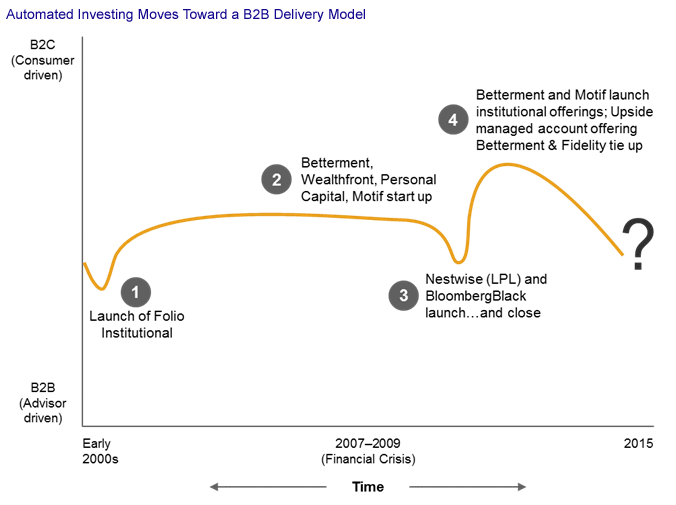Disrupting the Disruptors: RIAs, Online Brokers, and the Challenge to the Automated Investment Advisors
Abstract
The wealth management industry has been relatively sheltered from the digital revolution that is reshaping other areas of financial services, or at least it has appeared to be. But the cost-efficiency and scalability of automated investing platforms, combined with investors’ embrace of digital technology, has forced traditional wealth management firms to respond.
In the report Disrupting the Disruptors: RIAs, Online Brokers, and the Challenge to the Automated Investment Advisors, Celent looks at the accelerating cycle of disruption that characterizes wealth management today, in which traditional, advisor-centric providers are coming under pressure from technology-based market entrants, which in turn prove vulnerable to disintermediation themselves.
Evolution of this sort used to take place over decades; today, disruption is measured in years. Technology has been the driver of change, lowering barriers to entry and expanding the price and servicing options available to investors. These investors include the mass affluent segment and the equally underserved Millennial Generation, whose behavioral characteristics and privileged position as inheritors and generators of assets make them the future of wealth management.
The shift toward a technology-driven means of investing has undercut the role of the advisor and exposed inherent weaknesses in the high-cost model of brokerage houses and registered investment advisors. Looking ahead, however, automated investment advisors will face a more rugged environment defined by tighter margins and competition from online brokerages (in many respects the natural competitors of the automated investment advisors) and institutional players such as Vanguard and Charles Schwab, which have built-in client bases and are better positioned to withstand an eventual market downturn.

“Consolidation, whether the result of a price war or a weaker outlook for equities, will mark the end of what might be called Automated Investing 1.0, an era defined by a shift in market power from advisor to client, ” says William Trout, a senior analyst with Celent’s Securities & Investments practice and author of the report.

